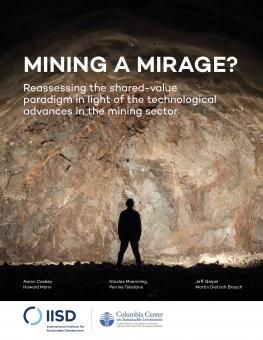
Mining a Mirage? Reassessing the shared-value paradigm in light of the technological advances in the mining sector
This report uses real-world mining data to estimate the impacts of new technologies on employment and employment-related procurement, which drive major benefits in host countries.
Technologies currently being deployed will mean that the mines of the future look much different than today’s operations.
Among the major changes will be fewer employees, thanks to labour-saving innovations. Yet local employment and employment-related procurement are major drivers of host country benefits, and an important part of the shared-value proposition.
This report, co-produced with the Columbia Center for Sustainable Investment, looks to the near and medium terms, exploring what will happen to the local employment and procurement components of the shared-value paradigm—and, by extension, to the mining companies’ social licence to operate—if technological change radically alters the amount of money mining firms are spending on hiring and procurement. It surveys the trends in technology development, and uses procurement and other data from two global mining firms to estimate the types of impacts we might see. It concludes by exploring the ways in which governments and firms might address the predicted results.
Participating experts
You might also be interested in
Why the Energy Charter Treaty Modernization Doesn't Deliver for Climate
The Energy Charter Conference adopted the "modernized" Energy Charter Treaty (ECT) on December 3, 2024. IISD's Lukas Schaugg explains what the modernization does, when it will enter into force, its tension with EU law, and why the reformed ECT can still hinder climate policies.
Artisanal and Small-Scale Mining of Critical Minerals
This report examines the potential for artisanal and small-scale mining (ASM) to take an expanded role in the global supply of critical minerals.
The Responsible Agricultural Investment Tool for Agribusiness and Case Studies
This report summarizes a collaboration to support agribusinesses in complying with principles of responsible investment in agriculture and food systems.
Stabilization Clauses: The hidden provisions that can hinder tax and investment policy reform
Stabilization clauses should no longer automatically be included in contracts between states and investors. If they are, they should, at a minimum, build on the latest international standards on stabilization to avoid being a barrier to sustainable development.